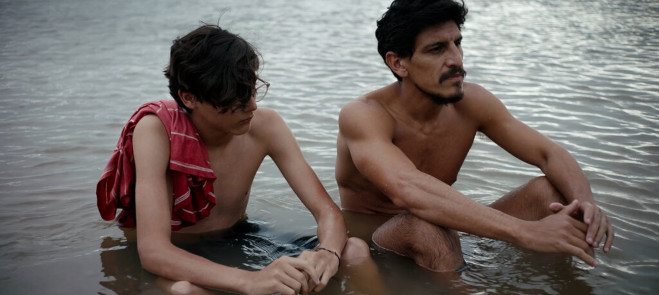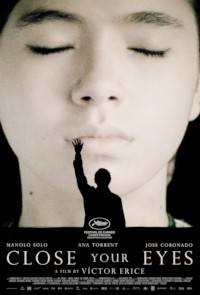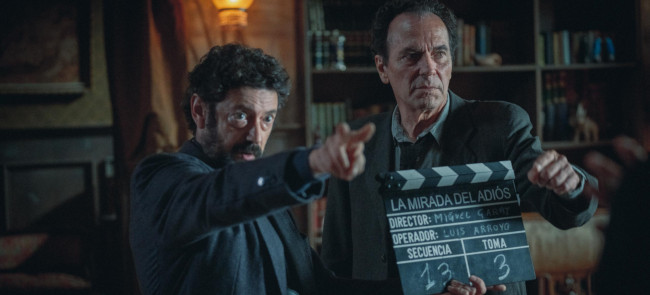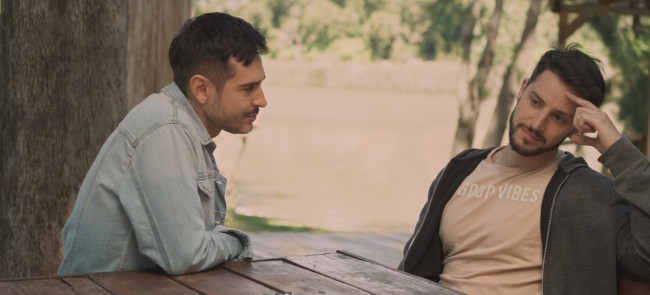| SHADOWS ON THE WALL | REVIEWS | NEWS | FESTIVAL | AWARDS | Q&A | ABOUT | TALKBACK | |||||||||||||||||||||||||||||
 Shadows off the beaten path Shadows off the beaten pathIndies, foreign, docs and shorts...
On this page:
CARNAL SINS |
CLOSE YOUR EYES |
SINCE THE LAST TIME WE MET
| |||||||||||||||||||||||||||||
| See also: SHADOWS FILM FESTIVAL | Last update 10.Apr.24 | |||||||||||||||||||||||||||||
|
Carnal Sins Almamula Review by Rich Cline | 
BERLIN FILM FEST Is it streaming?
|  Taking a darkly complex approach to a familiar story, Argentine writer-director Juan Sebastian Torales uses elements of fantasy and horror to knowingly explore a boy's dawning sexuality. The imagery is visually stunning, capturing the lush textures in the summery locations while grappling with tough topics. So the way the story unfolds is remarkably intense and suggestive. This is a striking comment on the damaging effects of religious repression. Horribly beaten by homophobic classmates and rejected by his religious community because he seems to be gay, young teen Nino (Diaz) certainly doesn't feel that God cares about him. With his parents (Soldi and Coronel) and cruel older sister Natalia (Grimaldi), Nino is spending the summer in a small town where another rejected boy has gone missing. In confirmation classes from the local priest (Ramallo), other kids are talking about the Almamula, a forest demon that steals impure children. Indeed, Nino feels like this is what he deserves, and he begins longing to be taken. It's horrible to see Nino's homophobic parents blaming each other for Nino's sexuality, while Natalia is a bully who torments Nino and goads her friends into summoning the Almamula. Meanwhile, the house is overrun with muscled workers, while Natalia's hot older friends play games in the pool, so everyone seems to be surrounded by sensuality and temptation. This of course ignites Nino's imagination in ways he is only beginning to understand. Performances are introspective and often heightened, charged with the inexplicable emotions swirling through Nino's mind. Young Diaz fills Nino with equal parts fear and hopeful anticipation about his emerging sexuality. As his dismissive mother, Soldi has terrific presence, deflecting his questions about carnal sins and impure thoughts. And Coronel is haunted and stone-faced as his father, who ignorantly turns to a grisly tradition to make a man out of him. As a voyage of youthful self-discovery, this film is unusually creepy, full of pointed sequences that provocatively take on enormous themes. Conversations are hesitant and often unfinished, as nobody wants to talk about these things, and they punish Nino for daring to mention them. So it's no surprise that Nino feels sacrilegious, and this gives the film a grim but vitally important kick.
|
| Close Your Eyes Cerrar los Ojos Review by Rich Cline | 
|  dir Victor Erice scr Victor Erice, Michel Gaztambide prd Cristina Zumarraga, Pablo Bossi, Victor Erice, Jose Alba, Odile Antonio-Baez with Manolo Solo, Jose Coronado, Ana Torrent, Maria Leon, Mario Pardo, Petra Martinez, Soledad Villamil, Helena Miquel, Juan Margallo, Antonio Dechent, Venecia Franco, Josep Maria Pou release Sp 29.Sep.23, US Oct.23 afi, UK 12.Apr.24 23/Spain 2h49 CANNES FILM FEST TORONTO FILM FEST   Is it streaming?
|  Masterfully directed to allow a complex story to unfold in its own time, this Spanish mystery has a slow-burning intensity that quietly churns through each scene. Expert filmmaker Victor Erice is taking a lyrical approach that's powerfully intimate, and there's added interest as the plot touches on political and cinematic history. So in addition to telling a riveting story, the film is packed with gorgeously engaging sequences. After shooting two scenes of a 1947-set drama The Farewell Gaze in 1990, actor Julio (Coronado) vanished. Now in 2012 Madrid, the film's director Miguel (Solo) is being interviewed about this mystery by journalist Marta (Miquel) for the TV series Unresolved Cases. This spurs him to revisit old friends, including his film editor friend Max (Pardo), Julio's daughter (Torrent) and a shared ex-girlfriend Lola (Villamil). Back home on the coast, Miguel continues to ponder his friend's fate. Then after the interview airs, Miguel gets a call saying that an amnesiac janitor might actually be Julio. Extended scenes feature long periods of silence and conversations that dig deeply into the experiences and connections of the characters. The film's gentle pace reflects the feelings of these ageing people as they look back on their now-distant past, with subtle reflections on Franco's dictatorial rule into the mid-1970s. As youthful sailors, Miguel and Julio were once arrested and beaten for public order offences. Interaction between a range of characters continually reveals momentous events that have shaped them. The easy pace allows the actors to deliver wonderfully understated performances that ripple with nuance, allowing emotions to ripple beneath the surface. As Miguel, Solo creates an evocative portrait of a man still haunted by losing his best friend, his film and his career in one fell swoop. His connection with the riveting Coronado's Julio is fascinating. The entire ensemble is terrific, as even the smaller side characters are played in ways that continually bring out sparks of personality. Reimagining key moments of the past that exist only in swirly memories, the film has an almost dreamlike quality to it, realistic and engulfing. As Miguel digs deeper into his past, his discoveries are remarkably moving. Each resolution to this mystery raises new questions that tap into the people he and Julio used to be. And the film's second half takes on themes relating to memory and legacy, and ultimately the magic of the movies themselves.
|
| Since the Last Time We Met Desde la Última Vez que Nos Vimos Review by Rich Cline | 
|  dir-scr Matias De Leis Correa prd Murray Dibbs, Matias De Leis Correa with Patricio Arellano, Esteban Recagno, Martin Stark, Josefina Langlois, Matias De Leis Correa release Arg 19.Oct.23, UK Mar.24 flare, US 12.Apr.24 23/Argentina 1h21  Is it streaming?
|  Sensitive and introspective, this drama from Argentina explores a reunion that raises a range of lingering feelings. With its dialog-based script and limited cast and settings, the film feels like a play, packed with complex conversations that tap into deep ideas. Filmmaker Matias De Leis Correa quickly gets under the surface, exploring the knotty nature of relationships. So it's an involving and very moving film, packed with recognisable truths. Perpetually single, Victor (Arellano) is surprised to run into his ex David (Recagno) in the street, and to learn that he's now married to a woman. Catching up on the past 15 years, David apologises for hurting Victor, then he moves in for a kiss. Victor stops him and asks him to leave, but they instead begin to to speak more calmly and openly. They also end up in bed and begin a new relationship, but only when David's wife is travelling on business. Although Victor doesn't want to just be something on the side. Days count down on-screen between meetings, adding context to their connection. After seeing random men, Victor muses in voiceover about how the ground shifts when he reconnects with David. But David is such a mess that he is incapable of engaging with Victor transparently. They recall the adrenaline rush of their secret relationship back in their early 20s, when no one knew they were gay. So when his heart was broken, Victor couldn't share his pain with anyone. And he feels like David is pushing him back inside the closet. Big emotions make both men sympathetic. Even if David is closeted and self-centred, and oddly pushy about sex, his feelings are genuine. And Victor knows that reconnecting is perilous. But Arellano and Recagno have natural chemistry, a strong connection that feels almost plaintive. Is this a final resolution to their relationship or the start of something new? These are low-key, open-handed performances that reveal huge emotions without tipping into melodrama. Movie relationships are rarely as complex as this, containing layers that are happy and sad. This makes the film cute, engaging and profoundly thoughtful. There are no easy answers, so we care what happens, especially when these men speak about the future, imagining possibly reaching older age and still being alone. But David is seeing a version of Victor that he doesn't recognise in himself. And both have very different perceptions on their time together. This gives an extra kick to the film's pointed revelations and observations.
| 
See also: SHADOWS FILM FESTIVAL © 2024 by Rich Cline, Shadows
on the Wall
HOME | REVIEWS | NEWS | FESTIVAL | AWARDS
| Q&A | ABOUT | TALKBACK | | ||||||||||||||||||



